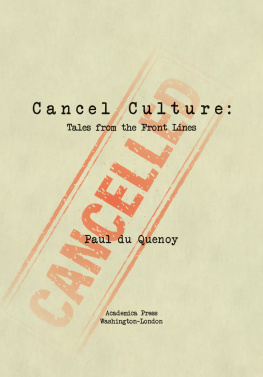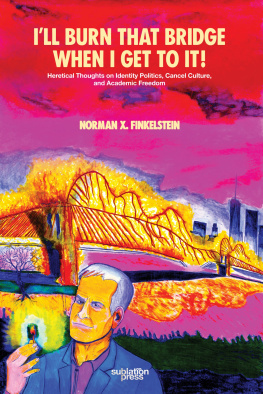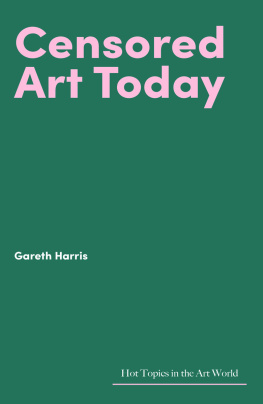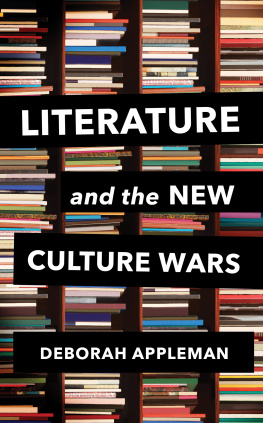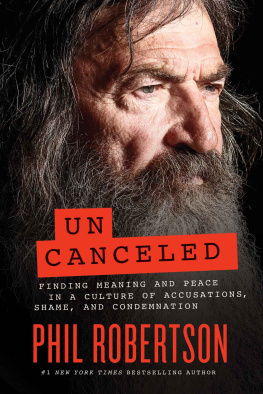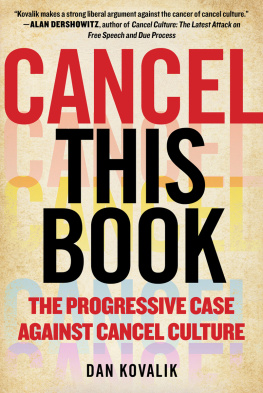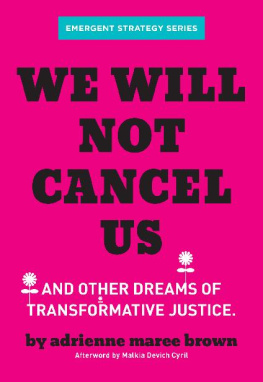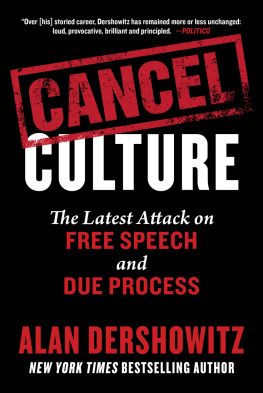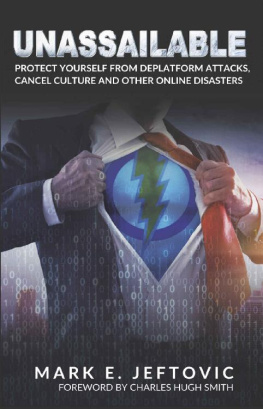Library of Congress Cataloging-in-Publication Data
Names: du Quenoy, Paul (author)
Title: Cancel culture : tales from the front lines | du Quenoy, Paul
Description: Washington : Academica Press, 2021. | Includes references.
Identifiers: LCCN 2021947823 | ISBN 9781680537529 (hardcover) | 9781680537536 (paperback) | 9781680537543 (e-book)
Copyright 2021 Paul du Quenoy
Introduction
This collection of essays explores one of the most pernicious developments of our times. Arising from pop culture slang to describe the removal of an undesirable person from ones social ambit, the term cancel culture has come into general use for the elimination of an idea, object, creative work, or, indeed, a person thought to be objectionable by individuals or groups who have the informal power to have objects of their disapproval proscribed from public life.
The process is never democratic or in line with the founding principles of our country. Regardless of traditional concepts of liberty and our foundational rights of free speech and expression, an outrage mob can form either in person or online and publicly denounce an affront to its sensibilities so great that it must be eliminated, or at the very least subjected to some form of warning or caution establishing that no decent person would tolerate or engage with it.
If this sounds un-American, it certainly should. Our Constitution opposes it in both letter and spirit. Some 64 percent of Americans including 48 percent of Democrats believe that cancel culture is a serious threat to their personal freedom. Eighty-eight percent identify it as a problem of some degree of magnitude, with the largest proportion of respondents 36 percent calling it a big problem. More than half our population worries that expressing a disfavored political opinion could cause them to lose a job, a phenomenon that is hardly unknown. Sixty percent of college students believe they would face negative consequences if they voiced a controversial point of view, while 80 percent of them report having self-censored their speech at least some of the time.
Such fears are far from unfounded. Nearly 90 percent of colleges and universities restrict certain forms of speech and are required by U.S. government administrative directives to investigate and punish broadly defined forms of discriminatory harassment with sanctions up to and including expulsion or dismissal. Some 40 percent of millennials favor suppressing free speech that others find offensive, a higher percentage than in any other demographic group, the older of which have living memories of communism and fascism.
An extraordinary 66 percent of college students believe it is acceptable to shout down a speaker with whom they disagree, while nearly one in four now supports the use of physical violence against someone with an opposing point of view. In some of our nominally best institutions of higher education, violent attacks against controversial speakers have taken place, causing bodily harm and extensive damage, generally without any significant consequences for the perpetrators. The trends suggest that these attitudes are worsening the 25 percent of college students who support violent action in 2021 represents an increase from 20 percent who felt that way the previous year. As this book goes to press, the Attorney General of the United States has issued a directive instructing the FBI to police public school committee meetings for supposed threats and intimidation, including mere expressions of disagreement with controversial school policies and lesson plans.
Unsurprisingly, proponents of cancel culture try hard to mask both its efficacy and scale. Some deny that it exists at all, while others have attempted to reclassify it as accountability culture or consequence culture, which they believe to be a popular phenomenon that produces sensible outcomes in response to expression that they personally find objectionable or out of step with modern sensibilities (usually as defined by them). Still other apologists have argued that while cancel culture may be real, it is not so very bad in practice since they suppose it affects only a relatively small number of people, and since its victims can sometimes rebound from it. In a jarring paradox, others have even defended cancel culture as itself a manifestation of free speech, including in cases when it disrupts or denies the free speech of others.
Despite these weak and sophistic arguments, there can be little doubt that cancel culture is a real phenomenon and pervasive in our hypersensitive and increasingly polarized public sphere. If it were not real, and a real problem, why have so many people written and worried about it, and why do the arguments of cancel culture deniers sound so ridiculous and even offensive?
This book explores the phenomenon with an eye toward explaining not merely how cancel culture happens but also and crucially how it can be resisted. It is brief because the anatomy of cancel culture is simple, as, I believe, is the solution.
In presenting a selection of my own writings over the past year and a half, I have identified sixteen cases of cancel culture across three broad and very important areas academia, the arts, and popular entertainment that are relevant to our daily lives and to the general health of our country. I have resisted reproducing mere outrage copy, texts that decry cancel culture per se, but prefer to look at it as a process. The process always has a discernible beginning a call to action expressed in a public forum. There then follows a reaction to that call to action: an authority figure responds often anonymously or with little fanfare in a way that dignifies the call and its motivations. In too many cases, it ends there. The statue is removed, the television show is canceled, the bad man (and it almost always is man) is fired.
It is in the fallout that the process becomes interesting. After someone or something is canceled, reactions vary. Sometimes nothing happens at all. Timid professional colleagues of a canceled individual, for example, typically remain silent out of apathy or fear that they may be next. College students with expensive degrees and coveted career paths to worry about often demur from antagonizing their activist peers and the professors and administrators who these days almost always agree with them, or at least say they do. People resisting questionable accusations of racism against others are fully aware that they themselves might be called racists if they speak out. Suburban dissenters are happier to keep their mouths shut rather than risk being thrown out their book clubs and food coops.
On other occasions, only a weak response is offered. Comfortably situated conservative columnists might complain in the pages of some principled publication and conclude with a comment that they imagine to be witty before straightening their bowties for the next cocktail party at which their Blue State neighbors will tolerate their presence. Tweedy bourgeois types who wish to avoid appearing impolite or guilty of incivility indulge the safe habit of bemoaning the future of the country over private cocktails.
These responses do absolutely nothing to stop cancel culture. They merely signal that cancelation is a fact of life and that its opponents have no real resistance to offer. Cultural hegemony deciding which forms of expression are acceptable and which are not is simply ceded to the canceling mob. It is the easy and non-confrontational choice, but it commands no respect and only emboldens the cancelers. If they know they can act with virtual impunity, why should they stop trying to impose their vision of a fair and just society on people who they know will not resist them?

